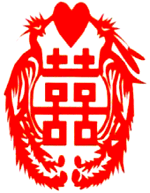Spree in the Bridal Chamber
 Though many traditional activities can no longer be seen at a Chinese wedding, the spree in the bridal chamber is still common both in the country and in town.
Though many traditional activities can no longer be seen at a Chinese wedding, the spree in the bridal chamber is still common both in the country and in town.
The spree happens after the feast when the bride and groom go back into their chamber. Relatives and friends and neighbors, any one at the wedding in fact, can come in to play all kinds of tricks on the new couple, especially the bride. They make a lot of noise so that there is an extremely lively atmosphere in the room, which is believed to be an inseparable part of a jolly wedding.
Some say that this custom goes back to Han Dynasty ((206 B.C.-A.D. 220). Others say it was first started by Emperor Zhao Kuangyin, the founder of the Northern Song Dynasty (960-1127). As historical records say that Zhao was concerned about his subjects and often made personal investigation among them. One day, he was traveling in a suburb of the capital city when he came across a wedding. When he learned that the groom was too poor to hire a musical band, he pretended to be the head of a band and called in his royal band to play at the wedding. At night, as Zhao remembered that it was an unlucky day according to the divination, he stayed at the yard with his military counselor Mr. Miao, so that they might be helpful in case any mishap happened to the couple. They sat in the dim moonlight playing chess. After midnight, they caught sight of a ghost climbing over the brick fence. Zhao picked up a wooden bar and ran up to the ghost. He knocked down the ghost only to find that it was a burglar wearing a mask, who had often been stealing property from newly married homes.
Emperor Zhao returned to the palace and made an announcement that at all weddings there should be relatives, friends and neighbors to stay around the brides and grooms and that all should be permitted to spree to keep off any eventualities.
Written by Ye Qinfa.
More info about Chinese weddings
Chinese Double Happiness Sticker (see the picture above)

